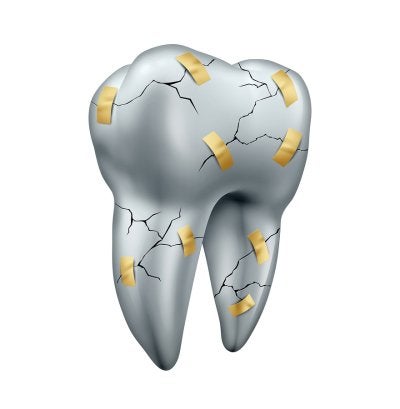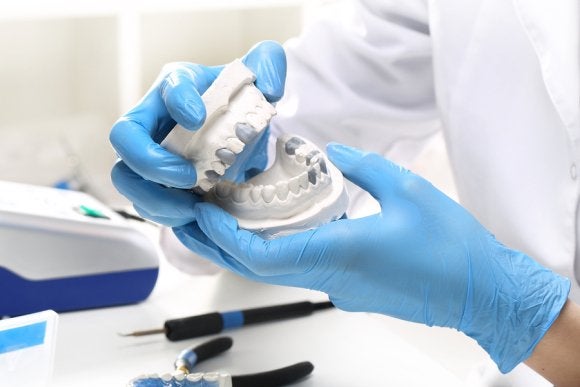-
Causes of Sensitive Teeth
Do you have sensitive teeth? You may need to make an emergency dental appointment with a dental clinic near Bel Air, MD to help find the root cause of your tooth pain. Read on to learn more about what your dentist might say is behind your current tooth sensitivity.

Tooth Sensitivity and Tooth Structure
In order to gain a better understanding of why your teeth have become sensitive, it’s important to first understand how the teeth are structured. The hard outer layer of your tooth is called tooth enamel. It protects the inside of your tooth, which mainly consists of dentin, a tissue filled with small tubes containing microscopic nerve endings. Your teeth may become sensitive when your tooth enamel is worn down, exposing the nerve-filled dentin below. This can potentially be very painful, especially when you eat foods that are hot, cold, acidic, or sticky.
Tooth Sensitivity and Dental Issues
Several different dental issues can cause your tooth enamel to become worn down and eroded. Even using a hard toothbrush during your daily dental care routine and brushing too aggressively can weaken your tooth enamel. Likewise, grinding your teeth at night can also damage tooth enamel. Ask your dentist to check for signs of grinding and excessive wear patterns on your teeth; he or she may recommend using a mouth guard at night so that the problem does not become exacerbated.
Tooth Sensitivity and Diet
If you tend to consume highly acidic foods and drinks, such as sodas and certain fruits, you may also be weakening your tooth enamel. Limit your intake of acidic foods and aim to brush after meals to get rid of leftover acid in your mouth. Finally, tooth decay, damaged fillings, and broken or chipped teeth can expose your tooth dentin—as can gum recession. Your dentist should be able to locate and repair broken dental work that may be causing your tooth sensitivity. As for gum recession, it’s important to maintain a proper daily dental hygiene routine in order to prevent additional gum recession and the pain that goes along with it.
-
What to Do About a Chipped Tooth
If you have a chipped tooth in Bel Air, MD, your first step should be to contact your dentist. A chipped, cracked, or knocked-out tooth is one of the most common dental emergencies . While a minor chipped tooth may not initially be accompanied by any adverse symptoms, chipped teeth can result in severe tooth pain or sensitivity. Even teeth that do not appear to be damaged can cause major health problems if left untreated. Keep reading to learn more about what you should do about a chipped tooth, including immediate care, professional care, and follow-up care.

Immediate Care
Even before you contact your dentist, you should rinse your mouth with warm water. After you chip a tooth in an accident or fall, bacteria and dirt can enter your mouth. Simply rinsing the affected area goes a long way toward preventing infection. If your mouth is bleeding, apply a clean piece of gauze and press firmly until the bleeding stops. If you cannot get in to your dental clinic on the day of the accident, purchase dental cement from your local drugstore to seal the tooth.
Professional Care
Depending on the size and severity of the chip, your dentist has many options for fixing your chipped tooth. If the chip is extremely small, a dentist may simply smooth and polish the affected area. If your tooth enamel has been damaged and the chip is visible to the naked eye, your dentists may use a filling, dental crown, or cap to restore the look and function of your tooth. If you have severely compromised the tooth structure, you may need a root canal to remove the infected inner tooth pulp.
Follow-Up Care
Follow-up care for your chipped tooth is highly dependent on your dentist’s recommendations. If you have had a root canal or need a prosthetic device like a crown or bridge, your dentist will give you exact instructions on how to care for your restoration and ward off infection. Regardless of your treatment plan, it is essential to maintain proper oral hygiene after chipping a tooth.
-
What to Expect When You’re Getting Dentures
Are you considering visiting your dentist in Bel Air, MD for dentures ? As one of the most common techniques in cosmetic dentistry, dentists have relied on dentures to restore missing teeth for decades.
When you visit your dentist for dentures, you can expect to completely restore your smile. If you are missing many teeth, you may feel understandably insecure. Missing teeth can make it difficult or even impossible to properly speak or eat. Additionally, having a full set of teeth is essential to your oral health and good dental care. With dentures, you can preserve existing healthy jawbone and maintain your face shape and structure. When you visit your dentist, he or she will first determine if you need complete dentures or partial dentures. Complete dentures are for patients who are missing all of their natural teeth. Conversely, a partial denture fills in spaces where multiple teeth are missing. Your dentist will also determine if you can have your dentures created right away or if you need to have your few remaining teeth pulled. In that case, your gums will need to heal before you can wear your new dentures.

-
Say No to Smokeless Tobacco
Good dental care in Bel Air, MD , involves quitting bad habits that damage your teeth. Speak to your dentist and watch this video to learn why even smokeless tobacco can compromise your oral health.
If you smoke cigarettes, your dentist has probably already advised you that quitting now will substantially decrease your risk for oral cancer, gum disease, and tooth decay. However, a dental clinic also regularly cautions patients that chewing tobacco places you at just as high of a risk for developing oral cancer as do cigarettes and cigars. Dentists have also linked chewing tobacco to bad breath, tooth discoloration, cavities, and a decreased sense of taste and smell.
RECENT POSTS
categories
- Uncategorized
- General Dentistry
- Toothache
- Emergency Dentistry
- Family Dentistry
- Receding Gums
- Cosmetic Dentistry
- Veneers
- Gum Disease
- Gingivitis
- Dental Crowns
- Orthodontics
- Dental Implants
- Root Canal
- Wisdom Teeth
- Teeth Whitening
- Your Smile
- Composite Fillings
- Lumineers
- Dentures
- Invisalign
- BrightSmile
- Dental Bridge
- Abscessed Tooth
- Sealants
